Greg Lisher | Interview | New Album, ‘Underwater Detection Method’
Greg Lisher, best known for his work with Camper Van Beethoven and Monks of Doom, ventures into uncharted territory with ‘Underwater Detection Method.’
While he’s been a staple in the alternative rock scene, this new solo album sees him stepping away from his guitar-centric past to explore new sonic landscapes with keyboards and synths.
“Fans might know me as a guitar player in an “alternative” band, but I really wanted to push myself with this album,” Lisher explains. “I’m hoping it surprises a few people.”
Following the 2012 release of his guitar-focused ‘Songs from the Imperial Garden,’ Lisher wanted something different. Drawing inspiration from artists like Brian Eno, he created an instrumental album blending elements of art rock, ambient, and prog. The result is a collection of 12 tracks that effortlessly mix melody with experimental sound. Some pieces feel cinematic, while others echo the quirky charm of vintage library music.
The album’s title, ‘Underwater Detection Method,’ captures Lisher’s approach—an unpredictable dive into new creative waters. “It’s like fishing,” he says. “You never know what you’re going to catch.” This sense of exploration permeates the album, with each track offering something unexpected.
The album comes in two vinyl variants (black and clear), a numbered special edition CD, and digital formats, all packaged with a striking 5-color design and perforated photo inserts.
‘Underwater Detection Method’ proves that after nearly four decades in music, Lisher is still finding new ways to surprise both himself and his listeners.
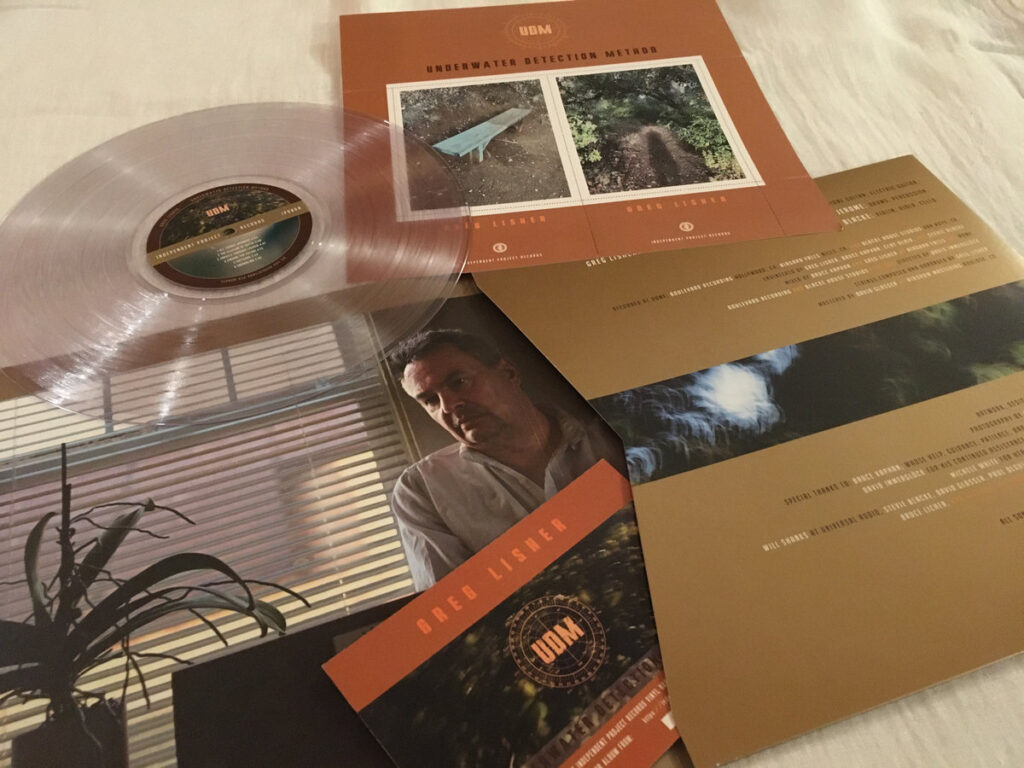
“Through that experimentation, I came up with the songs for Underwater Detection Method.”
Greg, let’s rewind to the early days. Tell me about your first musical obsession—the one that flipped a switch in your brain and made you think, I’ve gotta do this. Was it a particular band, a record, or even a moment?
Greg Lisher: I think I started learning how to play guitar in 1977, and that intersected with all these big hard rock bands that were popular at that time—Led Zeppelin, Pink Floyd, etc.
The first big rock concert my parents would let me go to was kind of a hard rock festival in 1978 called Day on the Green, which had lots of bands that were popular at the time, like AC/DC, Van Halen, and Aerosmith. I think when I started being able to see those big hard rock bands performing live was when the switch was flipped for me.
What was the scene like where you grew up? Any particular hangout spots that you’d haunt—record stores, dive bars, or those little venues that hosted bands just cutting their teeth?
I grew up in Santa Cruz, which was a small coastal tourist town in northern California.
By the time I was 18 or 19, I began hanging out with people who were into alternative/punk music, and there was a venue I started going to called Cha-Cha’s. A lot of those types of bands would pass through that venue, and I would go to see them, including some local bands. One of my favorite bands from Santa Cruz that played there at that time was a band that David Lowery played bass in, called Box of Laughs. That’s where I started meeting people who would eventually lead me to being in Camper Van Beethoven.
Can you give us a sense of what the underground music community felt like when you first got into it? Those early basement shows or the characters you’d meet back then?
The majority of shows I was playing by the time I joined Camper Van Beethoven were in small alternative clubs and bars. I don’t think I remember playing any basement shows, but there might’ve been a few shows we played at people’s houses.
Most of the people I would meet were kids who were into the alternative/punk rock music scene—kind of an independent DIY music scene.
When Camper Van Beethoven started gaining traction, was there a moment when you realized that this thing you’d built had taken on a life of its own? Or did it feel like you were just making it up as you went along?
I think, generally speaking, we were just making it up as we went along. And in the process of repeatedly working to do that, we were able to come up with some cool ideas and interesting music. A lot of times, David would just come in with an idea for a song, and by having the members of the band come up with their own parts, it kind of got pushed into different directions, which made it unique.
When we signed to Virgin Records and started having the opportunity to work with a producer and record at some great-sounding studios, it really started to feel like things were taking off.
What was it like transitioning from Camper Van Beethoven’s eclectic sound to forming Monks of Doom, where things got even more experimental? Was that shift a natural evolution for you, or were you consciously pushing against the boundaries of what you’d done before?
We put Monks of Doom together with the sole purpose of having an opportunity to experiment more musically and do some things that we just couldn’t do in Camper Van Beethoven. When we started the band, it just naturally took shape in its own way and reflected a lot of the influences we had as musicians outside of Camper Van Beethoven.
Dive into the creative process behind ‘Our Beloved Revolutionary Sweetheart’—how did you approach your guitar parts on that record? Were there any songs where you thought, “I’m going to push this in a totally different direction”?
By the time of ‘Our Beloved Revolutionary Sweetheart,’ I was spending a lot of time working out guitar parts by playing along to tapes of our songs that I had recorded at rehearsals on a cassette/boombox. I would just sit in my room and play along to these tapes over and over and try to work on crafting the right parts and solos to fit the songs.
I think I might have pushed the songs into a different direction—not because I was intentionally trying to do that, but because I was coming from such a different place musically than the rest of the people in the band. Whatever I would add to the songs would just kind of take them to a different place musically.
Jonathon was also pushing things musically with his violin.
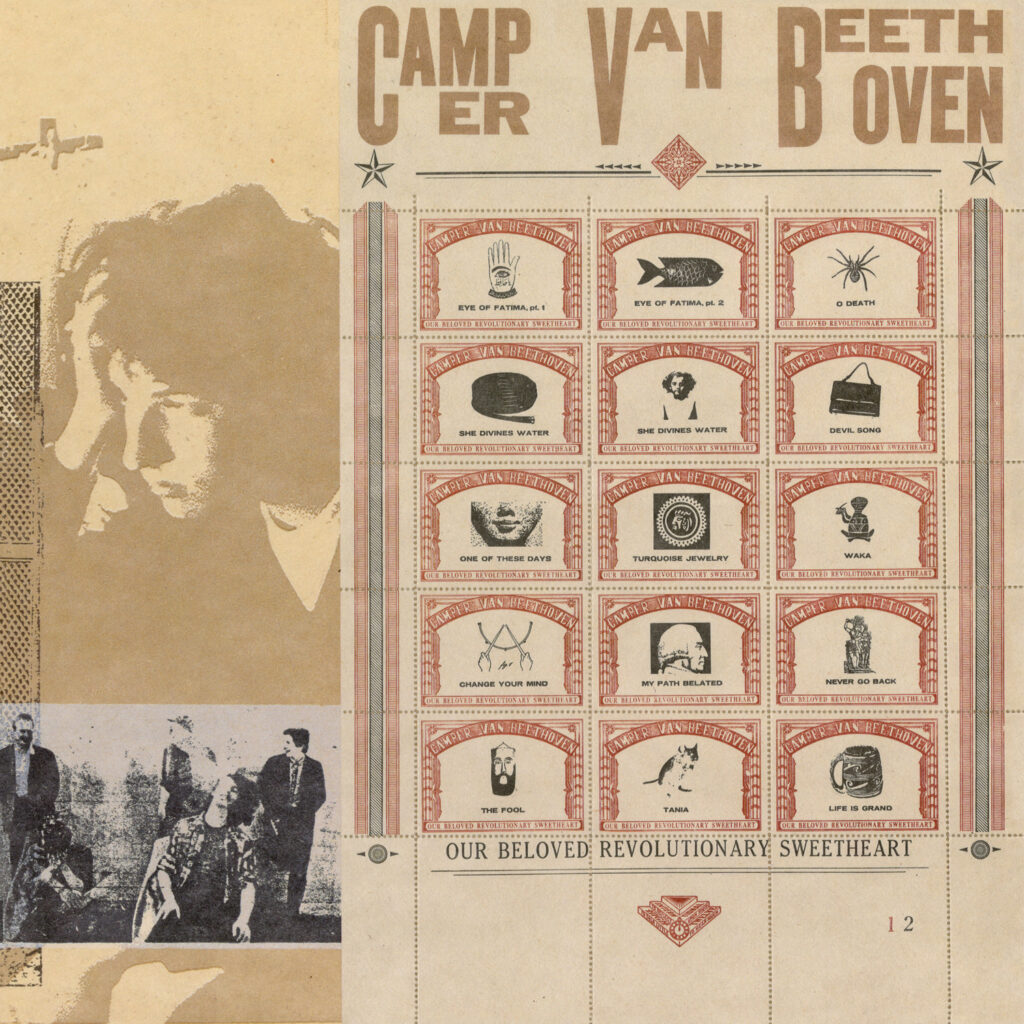
Camper Van Beethoven had this knack for blending punk, folk, and even hints of psychedelia. How did you navigate that melting pot of influences without losing your own voice in the process?
When I joined Camper Van Beethoven, I had come from such a different place than the majority of the other people in the band and was playing a lot of these styles for the first time, so I felt like I was just kind of making it up as I went along.
I was still trying to find my own voice by the time I joined the band, so I was just trying to keep an open mind and looked at all these different styles as a challenge for me to try to learn and grow as a guitar player.
I actually feel like a lot of my style and voice as a guitar player eventually came from me constantly trying to play these different styles I didn’t know how to play and eventually just kind of stumbled into my way of doing things and finding my own sound.
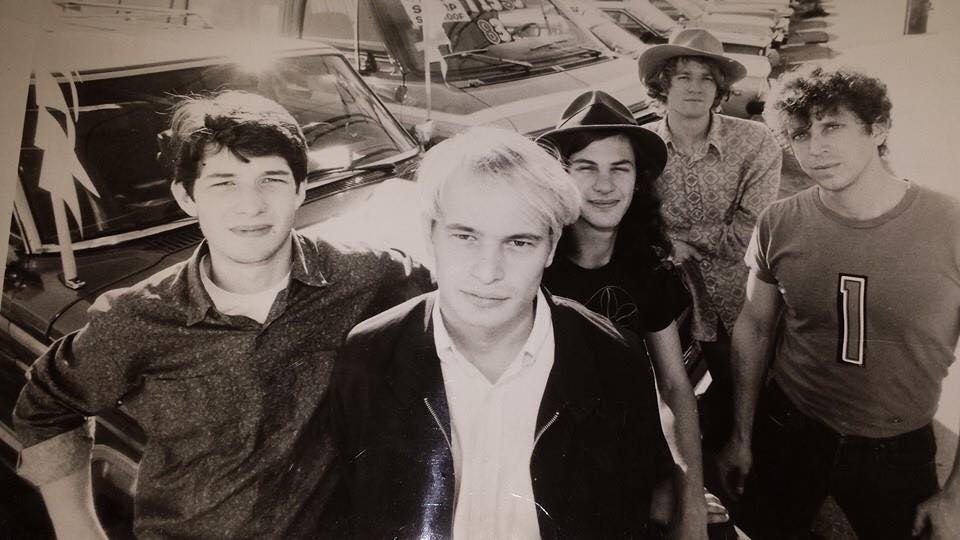
Let’s talk about gigs—any nights that still stick out in your memory? Whether it’s for a wild crowd, technical disasters, or just a perfect synergy between band and audience, what moments do you look back on with a grin (or a wince)?
I usually try not to remember the bad ones, so I can’t say that any of those really stick in my mind. But all of the shows are different, and there’s always something good you can take away or learn from all of them, including even some of the bad ones.
If we go through your time with Camper Van Beethoven, what albums do you enjoy working on the most and why? What are some of the best recollections from the writing process and recording sessions?
‘Key Lime Pie’ remains my favorite Camper Van Beethoven record to date. With Jonathan not being in the band at that time, it created a large hole for me to fill as a musician, and a lot of time spent making that record was just me and David. So, I think part of it was just the amount of my involvement in making the record. That was the Camper Van Beethoven record I was personally most involved in making.
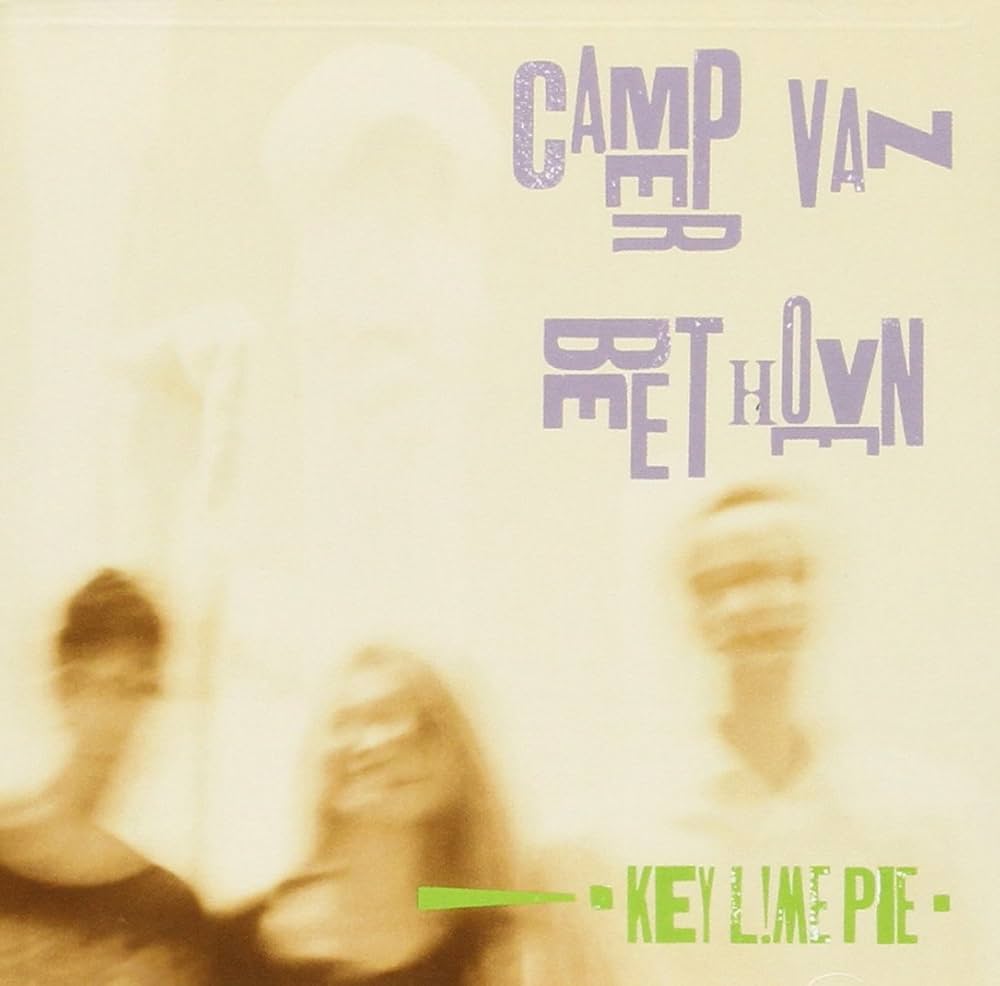
After all those years being known as a guitarist, what made you decide to pivot toward keyboards and synthesizers for Underwater Detection Method? What drew you into this new territory?
Well, I’ve always been a big fan of synthesizers and the bands that used them going back to the early ’80s, before I joined Camper Van Beethoven. Around the time I was making my last solo record, ‘Songs from the Imperial Garden,’ I bought some Reason software that I started learning how to use and experimenting with. Through that experimentation, I came up with the songs for ‘Underwater Detection Method.’
The title, ‘Underwater Detection Method,’ sounds like it’s got a whole concept lurking beneath it—like the idea of finding the hidden, the submerged. How did that theme shape the music itself?
Well, I came up with the title after I had finished making the record. I was just thinking of a title that would represent the process I went through putting it together. All the songs on that record were basically just written from scratch. I didn’t really have an idea of what I was going to do. I was just finding sounds that worked with other sounds and started putting things together. Through that process, I would be sent in one direction or another.
“I was never sure where it was going…”
You mentioned that writing this album was like fishing—you never knew what you’d catch. Did you ever reel in something unexpected while recording? A sound or a piece that made you rethink the direction you were heading?
I was constantly surprising myself with things I never intentionally started out trying to do. That’s what the majority of the whole record is. It was also kind of like riding a wave. I was never sure where it was going to take me but would just continue to ride it, and usually be surprised by where I would end up.
‘Finding the Future’ as the first single feels like a declaration, like you’re drawing a line between the past and what’s next. Is there a part of you that feels like this album is a reinvention, or is it more of a continuation of what you’ve always been about?
I think it’s definitely a reinvention of myself and me purposely trying to push myself and grow musically. I’ve spent my life playing guitar and felt like it was time to try something new. I also think it was an opportunity for me to make the music that I’ve always wanted to make.
When you’re crafting instrumental tracks, how do you decide when a piece is complete? Without lyrics to guide the narrative, what tells you, “Yeah, that’s it, that’s the story”?
Creating instrumental music is its own animal. With no lyrics, vocals, and vocal melody, you work even harder in some ways to keep things always changing to keep the listener’s attention. I guess in response to your question, I think you just work until it feels like things are falling into place or feel interesting enough. It kind of becomes obvious at a certain point when you’re finished.
Tracks like ‘Zen and the Art of Long Distance Driving’ and ‘Softly Pushing Through the Crowds’ have such cinematic names. Are these tied to personal experiences, or are they more like soundtracks to imagined moments?
I think it’s a combination of both. For instance, with the two tracks that you mentioned, those were more like images I conjured up in my mind in reaction to the way the music sounded. Song titles like ‘Travels Through Liguria,’ for instance, came to mind because the music from that song made me think of traveling through those regions of a tour I did in Italy back in 2008. I guess it just depends. If I can use my real-life experiences to pull from, I’ll do that. If I can’t, I’ll try and conjure something up.
How did working with Independent Project Records shape the process for ‘Underwater Detection Method’? They have such a distinct legacy—did their aesthetic influence the way you approached the album, especially when it came to the packaging and physical format?
I’ve always loved Bruce Licher’s artwork, and when I had finished up this record, I definitely thought his artwork would work really well for this type of album, especially regarding this kind of music. When I reached out to him, he informed me that he didn’t think he’d have the time to do the artwork for my record because he had just recently restarted the IPR label, and he thought he’d be too busy. So, I asked him if I could just send him the music and he could give me his thoughts on what he might do if he were going to do the artwork, and then I would forward those ideas to whoever ended up actually doing it. After I had sent him the music, he got back to me and said that he liked the music so much that not only did he want to do the artwork, but he wanted to put the record out on his label as well. So, you can imagine how excited I was to get that news.
Please share what the recording process was like for your latest album.
Everything started using Reason software. I originally started by scrolling through synth sounds until I would find patches that I liked and see what they might inspire me to play. Then, I would come up with chord progressions, melodies, baselines, and drum patterns (never in that same order) until I got some sections I liked. Then, I would create an arrangement out of these different sections to make a song. Through the process of working this way, I would slowly learn how these patches were put together, be able to edit them to fit my songs, and then gradually learn how to program my own patches.
You’ve spent decades making music that challenges norms. When you look back at those early CVB and MOD years, and then at what you’re doing now with ‘Underwater Detection Method,’ how do you see your evolution as an artist? Are there threads that have stayed consistent, or does it feel like a series of total reinventions?
This new record feels like more of a complete reinvention of who I am, just because everything before had always been so based around guitar. Although I play guitar on my record, it’s not guitar-centric music. The music starts with keyboards and not guitar. I don’t feel like there’s anything from Camper Van Beethoven that’s carried over into my new direction, but I feel like I’ve taken some elements from Monks of Doom with me as I move forward. Things like progressive rock and maybe odd time signatures, but once again, I have left behind a lot of the guitar-based focus.
If you could play one gig from the past again, any band, any era, which one would it be and why? And would you change anything about it—or leave it as it was?
That’s a hard question. I don’t really think that much about reliving events or shows I’ve played in the past. I don’t think I’d wanna change anything that’s happened in the past, as I feel like everything that’s happened has brought me to where I am now, if that makes any sense.
I would love it if you could talk more about your guitars and gear… tell us the details.
When it comes to guitars, amps, and pedals, I’m pretty much a traditionalist.
With electrics, it’s just Les Pauls, Stratocasters, and Telecasters through a Fender Blues Deluxe or just a Fender Deluxe Reverb. My pedal board is very straightforward: a TC Electronic PolyTune 3, Keeley Compressor, Keeley Phat Mod distortion, Keeley Tri Chorus, Boss TR-2 tremolo, and a Boss DM-2W delay.
Let’s end this interview with some of your favourite albums. Have you found something new lately you would like to recommend to our readers?
I don’t know about anything I could recommend that I’ve been listening to lately, but here are some of the records that influenced me during the making of my latest record:
YMO – ‘BMG’
Massive Attack – ‘Heligoland’
Tricky – ‘False Idols’
Richard Barbieri – ‘Stranger Inside’
Imogen Heap – ‘Sparks’
Brian Eno – ‘Another Day on Earth’
Ryuichi Sakamoto – ‘B-2 Unit’
Boards of Canada – ‘Tomorrow’s Harvest’ – ‘New Seeds’
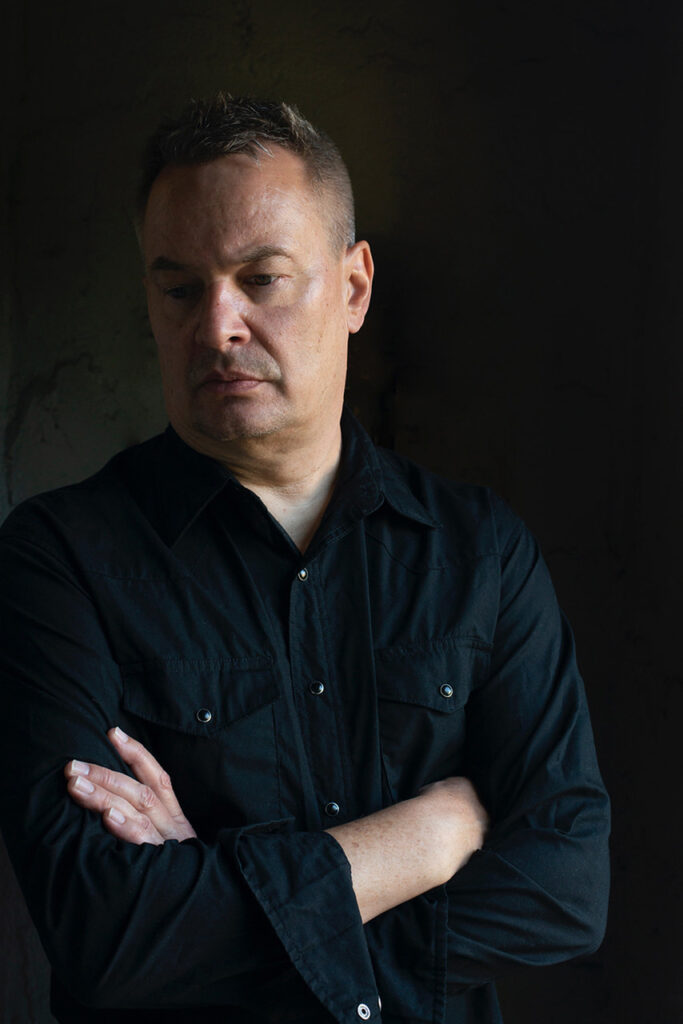
Finally, what’s something you wish more people would ask you about your work? Whether it’s a specific piece of music, a philosophy, or a moment in time that’s been overlooked.
I don’t really wish that anyone would ask me anything more than they already do. I’m content with that. However, I’d love it if people were more curious about where all the sounds on my records come from and what goes into making those sounds.
Klemen Breznikar
Headline photo: Kevin Bransfield
Greg Lisher Official Website / Facebook / Instagram / Twitter / Bandcamp / YouTube
Independent Project Records Official Website / Facebook / Instagram / Twitter / Bandcamp / YouTube

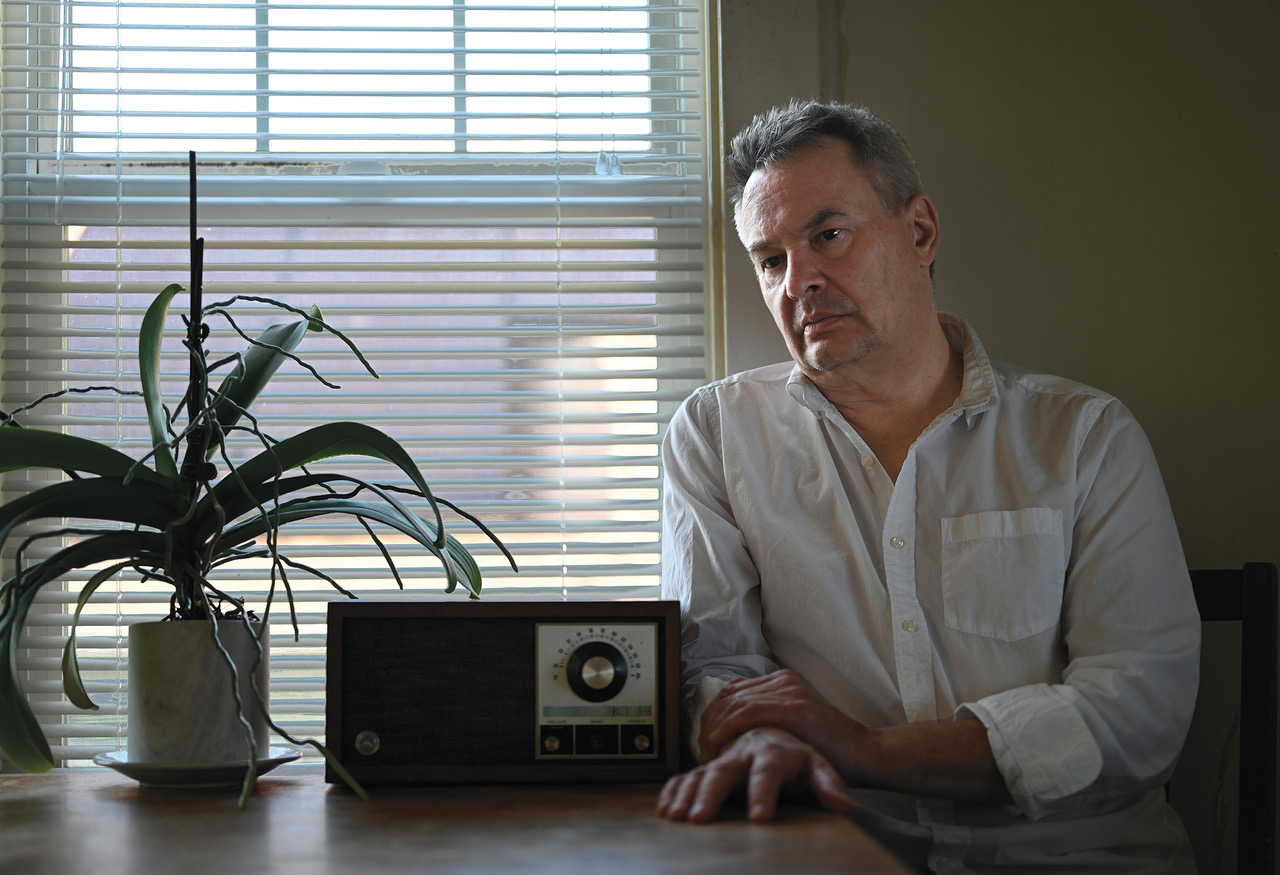



I knew your parents, always wondered about your music.